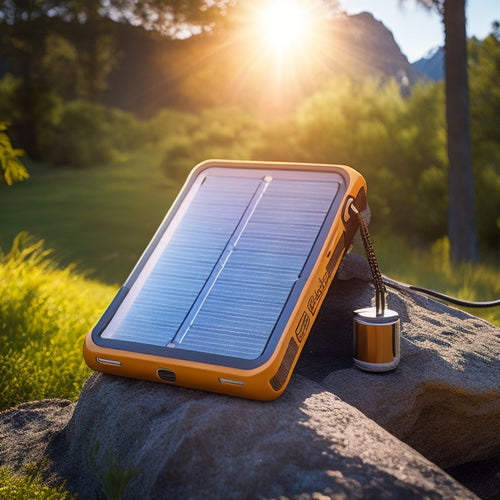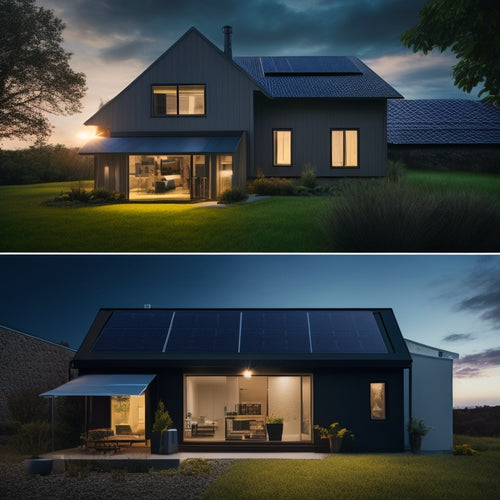
Power Your Home With Solar Energy Storage
Share
By investing in solar energy storage, you'll reduce your reliance on fossil fuels, decrease your carbon footprint, and gain energy independence. Solar battery backup systems allow you to store excess energy generated during the day for nighttime use, maximizing your solar energy utilization. With a range of panel types and system sizes to choose from, you can tailor your setup to your specific energy needs and location. As you investigate the benefits and technicalities of solar energy storage, you'll uncover how to optimize your system for cost-effectiveness, efficiency, and durability, and access a reliable, eco-friendly way to power your home.
Overview
- Solar energy storage reduces environmental impact, provides energy independence, and enhances reliability during grid outages and natural disasters.
- Solar battery backup systems store excess energy generated during the day for nighttime use, maximizing solar energy utilization and minimizing reliance on utility companies.
- Choosing the right solar panel involves considering panel types, system size, energy usage patterns, panel wattage, durability, and warranty to ensure optimal energy production and system efficiency.
- Solar energy storage systems can be cost-effective with the right installation, financing options, and incentive programs, making them a viable alternative to traditional energy sources.
- Integrating solar energy storage into daily routines, monitoring energy usage, and implementing energy-efficient strategies can maximize energy savings potential and increase independence from the grid.
Benefits of Solar Energy Storage
Many homeowners and businesses investing in solar energy systems are now reaping several benefits from incorporating solar energy storage into their setup. You, too, can enjoy these advantages by integrating energy storage into your solar power system.
One significant benefit is reduced environmental impact. By storing excess energy generated during the day for use at night or during power outages, you'll decrease your reliance on fossil fuels and lower your carbon footprint.
Furthermore, solar battery systems are designed for reliability in challenging remote locations, minimizing maintenance needs renewable energy integration, and they reduce vulnerability to grid failures and natural disasters, supporting energy autonomy and minimizing external power dependency.
In addition, solar energy storage provides energy independence, allowing you to power your home or business even when the grid is down. This means you'll have control over your energy usage and won't be at the mercy of utility companies.
How Solar Battery Backup Works
Reliability is the cornerstone of any solar energy system, and solar battery backup is the key to accessing it. With solar technology, you generate electricity during the day, and any excess energy is stored in a solar battery.
This cost-effective and eco-friendly solution enhances renewable security and guarantees a seamless shift to stored energy during low sunlight periods or nighttime. When the sun goes down or during an outage, your solar battery backup kicks in, providing you with a seamless shift to stored energy.
This means you can power your home with confidence, even when the grid is down. By having a solar battery backup, you're taking a significant step towards energy independence, reducing your reliance on the grid and enjoying the freedom to power your home on your own terms.
Choosing the Right Solar Panel
Frequently, homeowners overlook the importance of selecting the right solar panel for their energy needs, which can greatly impact the overall performance of their solar energy system.
When choosing a solar panel, you'll need to take into account the type of panel that best suits your energy requirements. There are several solar panel types, including monocrystalline, polycrystalline, and thin-film panels. Each type has its own efficiency ratings, ranging from 15% to 22%. Higher efficiency ratings mean more energy production per hour of sunlight.
Ideal system size is also vital, as it's determined by location and energy usage, and assessment of energy usage patterns is essential to identify daily requirements and peak periods. You should also take into account the panel's wattage, durability, and warranty.
Solar Energy Storage Systems Cost
You're likely wondering how much it'll cost to integrate a solar energy storage system into your setup.
System installation costs, which can vary widely depending on factors like location and system size, are a significant expense to weigh.
Additionally, you'll need to factor in the cost of individual battery units, which can range from a few hundred to several thousand dollars per unit.
System Installation Costs
As solar energy storage systems become increasingly popular, understanding the system installation costs is essential for individuals and organizations looking to integrate these solutions into their energy infrastructure.
When considering system installation costs, you'll need to factor in the cost of the energy storage system itself, as well as additional expenses such as installation, permitting, and maintenance.
Fortunately, there are ways to offset these costs. You may be eligible for incentive programs, such as tax credits or rebates, which can considerably reduce your upfront expenses.
Additionally, financing options are available, allowing you to spread the cost of installation over time.
Battery Unit Prices
When evaluating the total cost of a solar energy storage system, the battery unit price plays a significant role.
You'll find that prices vary depending on the type and quality of battery technology used. For instance, lithium-ion batteries, a popular choice for solar energy storage, typically range from $200 to $500 per kilowatt-hour (kWh).
Lead-acid batteries, on the other hand, are generally more affordable, with prices starting at around $100 per kWh.
As you consider your options, keep in mind that the environmental impact of your choice is also vital. Look for batteries with a long lifespan and recyclable materials to minimize waste and reduce your carbon footprint.
Top Solar Battery Brands Compared
You're likely considering multiple solar battery brands for your energy storage system, but how do you compare them?
To make an informed decision, you'll need to evaluate their battery performance metrics, such as depth of discharge, round-trip efficiency, and warranty terms.
Battery Performance Metrics
Evaluating the performance of solar batteries relies heavily on understanding key metrics that define their capabilities. When selecting a solar battery, you'll want to take into account factors like battery lifespan, discharge depth, and efficiency ratings to guarantee peak energy storage.
Temperature impact and cycle stability are also essential, as they affect the battery's overall performance and durability. Warranty terms, charging speed, and maintenance requirements should also be factored in to minimize downtime and maximize energy independence.
Additionally, look for batteries that meet safety standards and have a minimal environmental impact. By understanding these metrics, you'll be able to make an informed decision and choose a solar battery that meets your energy needs and promotes a sustainable future.
Top Brands Compared
Several top brands dominate the solar energy storage market, each offering unique strengths and weaknesses. When choosing the right brand for your solar energy storage needs, you'll want to take into account factors like brand reliability, warranty options, and overall performance.
| Brand | Capacity Range | Warranty |
|---|---|---|
| Tesla | 2-12 kWh | 10-year limited warranty |
| LG Chem | 3.3-12.8 kWh | 10-year warranty |
| Sonnen | 2-16 kWh | 10-year warranty |
Each brand has its own unique features, so it's crucial to research and compare them to find the best fit for your energy storage needs. Reflect on your energy usage, budget, and personal preferences when making your decision. By choosing a reputable brand, you can guarantee a reliable and efficient solar energy storage system that provides you with the freedom and independence you desire.
Installing Solar Energy Storage Systems
Installing Solar Energy Storage Systems
You're ready to take the leap and install a solar energy storage system in your home. This is a vital step towards gaining energy independence.
When selecting an installer, make certain they provide you with solar installation tips customized to your specific energy needs. They should assess your energy usage patterns and recommend the most appropriate energy storage technologies for your system.
Additionally, they should guide you through the installation process, confirming that your system is properly sized, configured, and integrated with your existing electrical infrastructure.
A reputable installer will also provide you with thorough warranties and maintenance support to guarantee your system operates at peak levels.
Maximizing Energy Savings Potential
As you integrate your solar energy storage system into your daily life, maximizing energy savings potential becomes a top priority.
To achieve this, you'll want to optimize your energy efficiency by identifying areas of high energy consumption in your home. This can be done by monitoring your energy usage patterns and adjusting your habits accordingly.
By doing so, you'll be able to reduce your reliance on the grid and increase your grid independence. Additionally, consider upgrading to energy-efficient appliances and lighting to further minimize your energy waste.
Frequently Asked Questions
Can I Use Solar Energy Storage Systems for My RV or Boat?
You can definitely use solar energy storage systems for your RV or boat, installing RV solar panels to charge your boat batteries, ensuring you have reliable off-grid power for extended journeys and ultimate freedom on the water or open road.
Are Solar Energy Storage Systems Compatible With All Electrical Panels?
You'll be surprised to know that 80% of homes in the US can't install solar due to insufficient roof space. Fortunately, most solar energy storage systems are compatible with standard electrical panels, accommodating various energy storage types, such as lithium-ion and lead-acid batteries, to guarantee seamless integration.
Do Solar Batteries Have a Warranty or Maintenance Requirements?
You'll typically find solar batteries come with a warranty ranging from 5 to 15 years, depending on the manufacturer, and require minimal maintenance, such as monitoring battery health and following maintenance tips to optimize battery lifespan.
Can I Monitor My Solar Energy Storage System Remotely?
You can remotely monitor your energy storage system, tracking performance and energy usage in real-time, and even control energy management functions, such as charging and discharging, through a dedicated app or online portal, giving you total freedom.
Are Solar Energy Storage Systems Eligible for Government Incentives?
You'll be pleased to know that solar energy storage systems are eligible for government incentives, including federal tax credits and state rebates, which can greatly reduce your upfront costs and increase your energy independence.
Ready to Buy
By investing in solar energy storage, you'll release the full potential of renewable energy for your home. For instance, a California homeowner with a solar-plus-storage system saved over $1,300 on their energy bills in a single year, despite experiencing a 10-day grid outage. By combining the right solar panels, battery backup, and energy storage system, you can enjoy reliable, cost-effective, and sustainable power - even when the grid goes down.
Related Posts
-

Why Outdoor Solar Lighting Systems Are Sustainable
Outdoor solar lighting systems are sustainable because they utilize renewable energy, drastically reducing your carbo...
-

Fastest Solar Chargers for Emergency Power
When choosing the fastest solar chargers for emergency power, you need to focus on features like rapid charging capab...
-

Cost of Home Solar Battery
You're looking to invest in a home solar battery to reduce your grid reliance, but you're curious about the cost. The...


